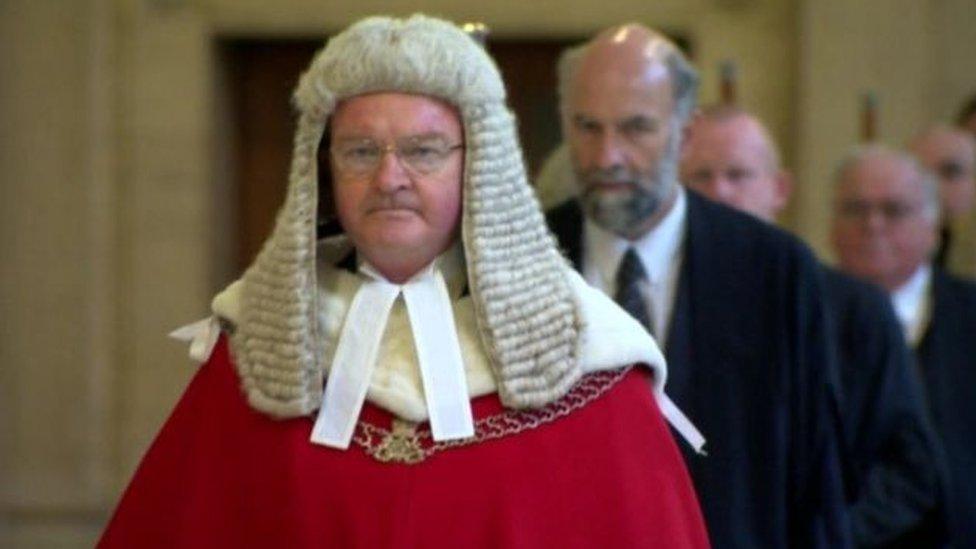Arlene Foster: DUP did not know of Sinn Fein 'legacy deal'
- Published
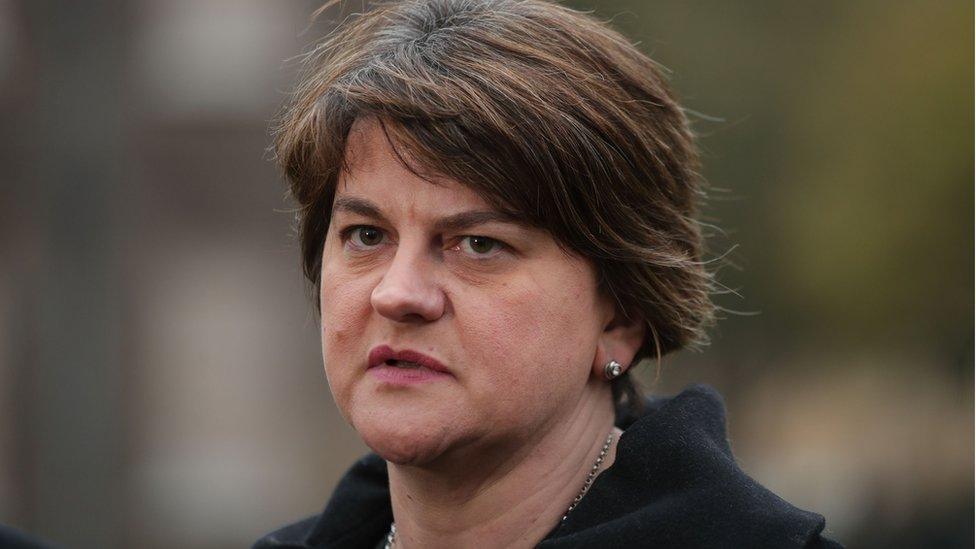
Arlene Foster said she would be raising this matter with Northern Ireland's secretary of state
Arlene Foster has said the DUP was not aware of a deal between Sinn Féin and the government on Troubles' inquests in the absence of an overall agreement.
The DUP leader said such a scenario would be "astonishing".
Sinn Féin said the government agreed to a consultation on legacy measures, omitting any statute of limitations to curb security force prosecutions.
The government replied that all its discussions were in the context of how it would respond to an overall deal.
During the latest round of talks to restore power sharing, Sinn Féin held separate meetings with the government on legacy inquests, while the DUP held its own negotiations with the government about the Military Covenant.
The Troubles legacy negotiations have been a long-running issue, and featured not only on the fringes of the most recent talks which collapsed on Valentine's Day, but also in the lead up to the 2014 Stormont House Agreement.
The legacy inquests include some of the most controversial killings of the Troubles, and Northern Ireland's most senior judge previously asked for money to deal with the backlog of outstanding cases.
Details of the inquest funding proposals were discussed by Sinn Féin MLA Gerry Kelly on the BBC programme, The View, on Thursday night.
He was reiterating a statement made last week by his party leader, Mary Lou McDonald, who said Sinn Féin had a separate "commitment" from the government to put inquest funding and legacy measures from the Stormont House Agreement out to public consultation.
Mr Kelly claimed that during their separate meetings, the government had agreed that the consultation would not include a proposal for a controversial statute of limitations.
However, the DUP's justice spokesman Sir Jeffrey Donaldson told The View he was not aware of any separate deal between the government and Sinn Féin.

Sir Jeffery Donaldson and Gerry Kelly were speaking on The View
In a statement on Friday, Mrs Foster confirmed that during the most recent talks, she had been aware that Sinn Féin was meeting the government over inquest funding, as this was "a matter of public record".
However, she said: "No one in the DUP was aware of inquest funding being progressed in the absence of an overall agreement or a decision to advance all elements of the Stormont House Agreement. "
The DUP leader said she would be raising the matter with Secretary of State Karen Bradley.
Controversial killings
However, Sinn Féin MLA Declan Kearney insisted that Mrs Foster and the DUP negotiating team did know about his party's agreement with the government to release the funding for legacy inquests.
He told BBC Radio Foyle the DUP leadership, who were involved in the negotiations, clearly understood that an agreement was being made.
He said he denied it was a side deal: Sinn Féin met and agreed with NIO officials that the funding would be released, he said.
Later, Sinn Féin vice-president Michelle O'Neill said she spoke to Victims Commissioner Judith Thompson on the progress made on legacy matters.
"It is wrong and unhelpful for some to be dismissing this as some sort of side deal," Ms O'Neill said.
"I updated the commissioner that the latest round of talks focused on three key issues including funding for legacy inquests, the initiation of the pre-legislative legacy consultation process and removal of the proposed 'alternative approaches to the past` section incorporating a `statute of limitations' or amnesty for state forces," she said in a statement.
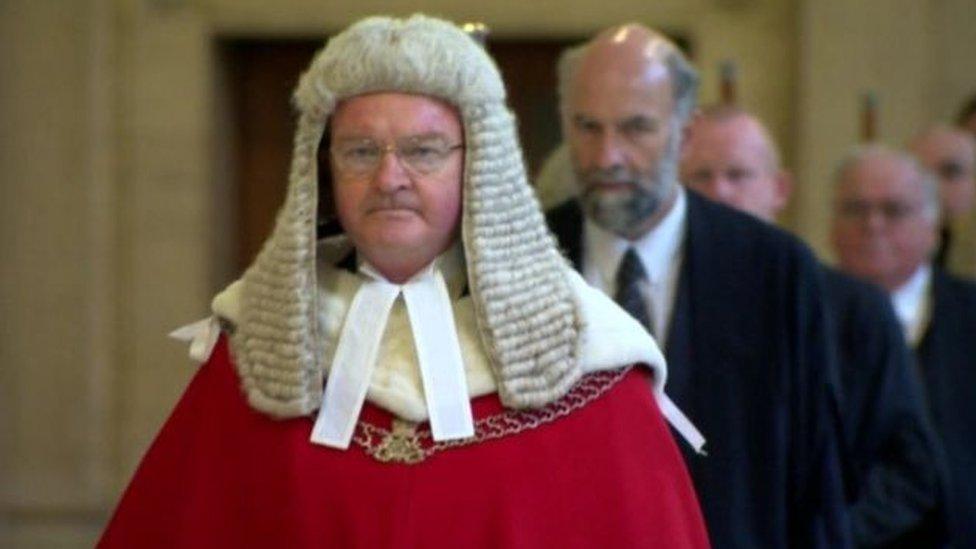
Sir Declan Morgan proposed setting up a legacy inquest unit in 2016
Alliance deputy Stephen Farry told BBC Radio Ulster's Evening Extra that Sinn Féin had asked the other parties for a meeting to brief them on the talks.
"In that meeting on Monday, they further reiterated that they believed they had a side deal with the UK government in relation to issues relating to the past," he said.
"They did say they had, as part of the overall potential agreement at the end of previous week, the potential for that deal with the UK government,
"But in the absence of a (overall) deal not happening, they still wanted to see that deal going ahead. They had not got that confirmation from the UK government, but they were going to ask for that."
In 2016, Lord Chief Justice Sir Declan Morgan requested £10m to fund a five-year programme of inquests into more than 50 deaths.
The list of cases included several killings which were carried out by members of the security forces.
Gerry Kelly said he had proof of his party's agreement with the government to release inquest funding and wanted to see it implemented.
"There are victims and survivors waiting - some of them over 45-46 years - give them some respite," Mr Kelly told BBC News NI's The View programme.

Terminology explained
The UK Military Covenant, external is a government pledge that no member of the Armed Forces, past or present, should face any disadvantage compared to civilians when accessing public or commercial services. The covenant also offers "special consideration" to some military personnel when accessing those services, especially those injured or bereaved as a result of their military career.
A statute of limitations is a legal regulation which effectively sets an expiry date for the prosecution of offences, in relation to the date the crime was committed. Statutes of limitations already exist in the UK, external for minor criminal cases, some sexual offences and many civil claims.

Last year, some Conservative and unionist MPs had called for a statute of limitations to prevent the prosecution of security force members for alleged offences from the early years of the Troubles.

Former soldiers have protested at Buckingham Palace and elsewhere about Troubles prosecutions
The idea was supported by Westminister's Defence Committee, which claimed legacy cases involving soldiers had been "unfairly prioritised" - a claim that was strongly disputed by Northern Ireland's Public Prosecution Service.
The cross-party group of MPs urged the government to "not lose sight of its moral responsibility to those who have served our country".
Military veterans have organised several marches and rallies, arguing it is unreasonable for historical charges to be brought against former soldiers who are now senior citizens.
However, the suggestion was strongly opposed by Sinn Féin, the Irish government and some victims' groups.
DUP leader Arlene Foster has also expressed reservations about a statute of limitations, fearing it will lead to a wider amnesty which might deprive Troubles victims of the chance of justice.

Analysis - BBC political correspondent Gareth Gordon
Claims Sinn Féin and the government agreed a side deal on legacy are not new.
Sinn Féin leader Mary Lou McDonald revealed some of the detail a week ago, though not Mr Kelly's claim that proposals for a statute of limitations were now to be dropped from the planned consultation.
Allow X content?
This article contains content provided by X. We ask for your permission before anything is loaded, as they may be using cookies and other technologies. You may want to read X’s cookie policy, external and privacy policy, external before accepting. To view this content choose ‘accept and continue’.
What is surprising is the claim from Sir Jeffrey - the DUP's Justice spokesperson - that he knew nothing about it.
He was adamant no such proposal was put to him and that he would be annoyed if it was correct.
Mr Kelly said: "To say that the DUP, whatever about Jeffrey, didn't know about this is erroneous."
It raises new and intriguing questions about just what went on during this failed negotiation and who agreed what with whom and who knew.
The murk just got murkier.

Mr Kelly told The View: "We had agreed the statute of limitations was not going to be in the consultation.
"The consultation was going to be put out and the money was going to be released to the Lord Chief Justice - that was agreed."
'Not surprising'
In response, DUP MP Sir Jeffrey Donaldson said: "I am our party's representative on legacy issues and I am not aware of the government agreeing with Sinn Féin that they were going to hand over money for inquests."
Asked for a response to reports that Sinn Fein had a side deal with the government, the DUP said: "Not surprising both sides will talk to the government about progressing issues of interest to themselves during negotiations.
"We also were speaking to the government about certain matters and progress was made."
The UUP said the DUP had "played fast and loose with the future of unionism".
The party's leader, Robin Swann, said it was an "outrageous" situation.
"Unionism now finds itself being a spectator as Her Majesty`s Government agrees a legacy deal behind our backs and apparently without the DUP's knowledge," he added.
The Northern Ireland Office (NIO) said all discussions with parties were in the context of how the government would respond in the event of a deal.
"Sadly there was no deal," said an NIO spokesperson. "However, as the secretary of state made clear on Tuesday, she will still be consulting on how to implement Stormont House [Agreement] legacy institutions as soon as possible."
"The government announced £150m to support legacy reform in 2014."
- Published5 September 2017
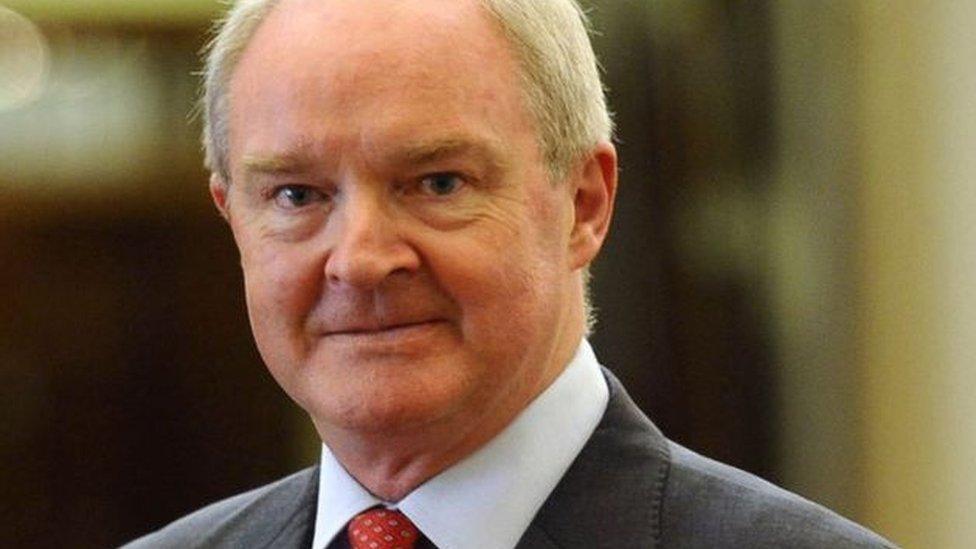
- Published5 September 2016
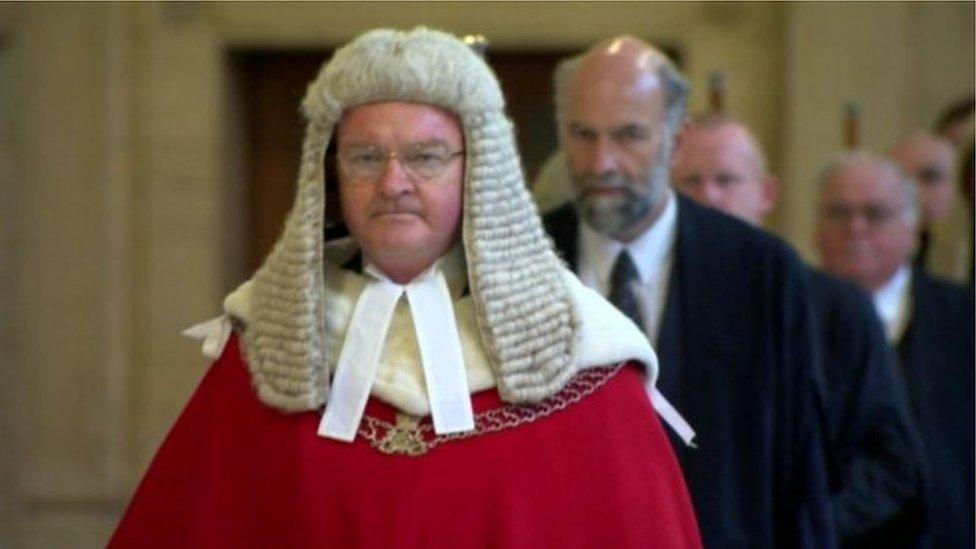
- Published12 February 2016
